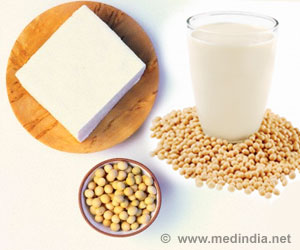
‘Soy protein can reduce your bad cholesterol levels and boost your heart health. So, make sure to include soybean, tofu, and other soy products to your regular diet to keep your heart healthy.’
Read More..Tweet it Now
The study calls into question the U.S. Food and Drug Administration's current proposal to revoke the health claim for soy protein and heart disease.Read More..
"At no time since the original claim for soy as a reducer of serum cholesterol has its ability been in question," says David Jenkins, professor of nutritional sciences and of medicine at U of T. "It's been consistent since 1999. The data have not changed."
The researchers showed a reduction from soy in both total cholesterol and low-density lipoprotein cholesterol, which can damage the heart. The effect is steady across all 46 trials that the FDA cited in 2017, when it first proposed to revoke the health claim for soy-based on recent trials that showed variable results.
"Sometimes you see a regression to the mean, where analyses with small studies produce big effects that diminish over time as sample sizes increase and results get more precise," says John Sievenpiper, a professor of nutritional sciences at U of T and clinician-scientist at St. Michael's Hospital who co-authored the study. "We saw that with fish oil, for example. But in this case, nothing has changed."
The researchers performed a cumulative meta-analysis, which let them look at the effect of soy in all the trials combined, but at different points in time with the addition of data from each new trial. The FDA will likely make a decision on the health claim for soy this summer; options include a full retraction and retention of a qualified health claim.
Advertisement
Jenkins and his colleagues in the 1980s pioneered the glycemic index, which shows the effect of various foods on blood sugar levels. More recently, he helped develop a dietary portfolio that includes nuts, plant-based protein, viscous fiber and plant sterols, which together can lower risk factors for heart disease by up to 30 percent.
Advertisement
"It's disheartening that the FDA has focused on soy," says Jenkins. "We see similar data for other foods in the portfolio. If you knock out one leg of that stool, then the others could be up for grabs, right when concerns about health and the environment are bringing plant-based eating into the mainstream."
Companies such as Beyond Meat and Impossible Foods have seen huge growth this year with plant-based alternatives to meat. Burger King plans to offer its soy-based burger nation-wide in the U.S. by the end of 2019.
"We're moving into an age of plant-based protein, and it would be a shame to see that shift undermined," says Jenkins. "Plant-based food producers, industry, and retailers need all the help they can get, to make their products accessible."
Professors Jenkins and Sievenpiper have received support from the government, non-profit and industry funding sources, some of which include companies and industry groups that produce or promote soy and other plant-based foods. See the Disclosures section at the end of the study for a full list of their funding sources and industry connections.
Source-Eurekalert















